
In 2020, the Nichirei Group identified five material matters (materiality) and set a vision for each of them in order to achieve the long-term management goals for 2030. We are promoting sustainability management by executing measures that address the material matters while balancing social and economic value.
| Material Matters (Materiality) | Vision for 2030 | Group Measures | Group KPIs for FY2031 | Applicable SDGs | ||
|---|---|---|---|---|---|---|
| 1 | Creating new value in food and health*1 | Create new markets and customer value by taking on challenges outside existing areas in both food and health | Discover the potential of materials and cooling power to contribute to the future of the Earth and people’s mental and physical health through food |
|
|
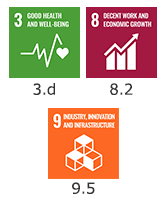 |
| 2 | Strengthening food processing and production technology capabilities; enhancing logistics services | Further refine core competencies in food processing, production and logistics to resolve social issues and improve profitability through competitive advantages in global markets | Ability to generate cash improved by concentrating management resources on core businesses | Promote capacity expansion, work process innovation, reduction of environmental impact, and development of business foundations through proactive capital expenditures in the processed foods and temperature-controlled logistics businesses |
|
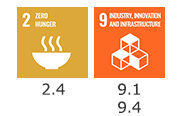 |
| Overseas business as a new pillar of earnings | Accelerate overseas expansion by securing and training globally capable human resources, cultivating partner companies, conducting M&A and other means |
|
 |
|||
| 3 | Realizing sustainable food procurement and a circular economy | Resolving various social issues related to the supply chain, which is the foundation of our business, and contribute to sustainable food procurement and the realization of a circular economy | All raw materials and ingredients are procured from suppliers and partner companies that comply with the Nichirei Group Supplier Code of Conduct and Supplier Guidelines | Establish a supply chain with consideration for human rights and the environment and conduct due diligence |
|
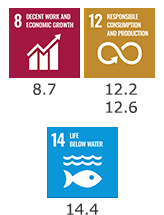 |
| Promoting a circular economy by creating new business models | Work to conduct sustainable resource procurement and help to realize a circular economy |
|
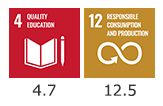 |
|||
|
 |
|||||
|
 |
|||||
| Understanding risks to natural capital and improving resilience related to biodiversity and water resources | Conserve biodiversity and water resources through business activities that consider ecosystems |
|
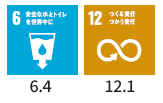 |
|||
|
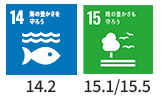 |
|||||
| 4 | Climate change initiatives | As a food and logistics company that is greatly affected by climate change, we will work with stakeholders to counter global warming and reduce energy consumption throughout the supply chain | Efforts underway to reduce CO₂ emissions both inside and outside the Group toward the goal of becoming carbon neutral by 2050 | Reduce CO₂ emissions per unit of production and utilize renewable energy at food factories and logistics centers, and disclose information based on the TCFD recommendations |
|
 |
| Elimination of CFCs progressing at production and logistics facilities as a global warming countermeasure |
|
|
 |
|||
| 5 | Securing and developing a diverse array of human resources | Secure and develop diverse human resources and foster an inclusive corporate culture to achieve sustainable growth | Diverse human resources with various characteristics and skills, maximizing their potential to improve their job satisfaction and support the sustainable growth of the Group |
|
|
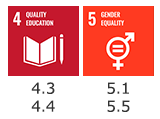 |
|
|
 |
||||
Nichirei believes that enhancing corporate value requires initiatives that improve profitability (ROIC, ROE), reduce capital costs (WACC), and promote growth expectations (PER). We view the execution of measures to address our material matters as contributing to the improvement of these three types of economic value, thereby enhancing corporate value. By continuing to promote non-financial measures that address our material matters, we will create both economic and social value, which will ultimately enhance corporate value.
Material Matters (Materiality)


Non-financial Measures
Expected Non-financial Value
| Strengthening R&D and marketing functions | Details | •Creation of new value •Enhancement of brand value |
| Developing and promoting products and services addressing health and the global environment | Details | |
| Promoting innovation | Details | |
| Enhancing processing and production technology | Details | |
| Enhancing temperature-controlled logistics services | Details |
| Conducting Supplier ESG Survey and due diligence with suppliers | Details | •Sustainable procurement of raw materials and water resources •Reduction of human rights risks •Enhancement of brand value |
| Promoting an increase in the ratio of marine products with MSC and ASC certification | Details | |
| Sustainable palm oil procurement | Details | |
| Conservation of water resources and biodiversity | Details |
| Reduction of CO₂ emissions | Details | •Reduction in environmental impact •Enhancement of brand value |
| Transition to natural refrigerants | Details |
| Initiatives to promote women’s participation | Details | •Creation of new value •Improvement of performance •Enhancement of brand value •Securing human resources •Strengthening the management base |
| Upgrading the occupational health system and enhancement of health literacy education | Details | |
| Securing and developing globally capable human resources | Details | |
| Sustainability and DX education, and development of next-generation management personnel | DX Human resources |
|
| Improving employee engagement | Details |


Financial Value Drivers




Enhancement of corporate value